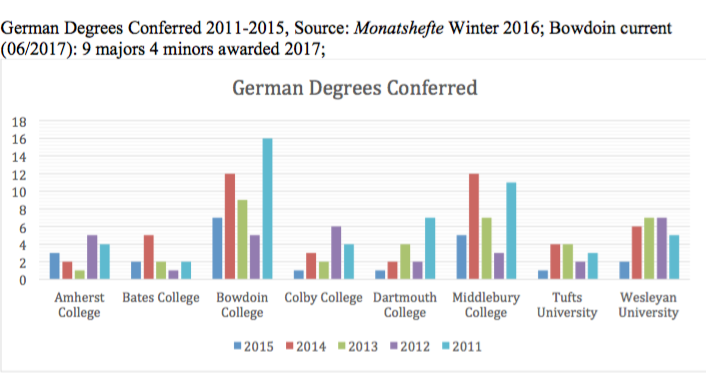German Looks Ahead to "Continued Excellence' in 2018
Campbell, who is on the awards committee of the AATG, made her remarks in November 2017, after the association honored Bowdoin’s German department as a “center of excellence.” Speaking at the awards presentation ceremony in Nashville, TN, she said it was hard to imagine an undergraduate program that more embodies the “small but excellent” label. “Innovative, dedicated to students, connected to the community are just a few of the ways in which both students and colleagues have described the Bowdoin German program.”
Department chair Jill Smith, the Osterweis Associate Professor of German, said it means a lot to be honored by the AATG. “It’s a national organization that supports both teaching and research in German at all levels. It was the first organization I joined, even before I began my graduate work in German, and it publishes one of the flagship peer-reviewed journals in our field, The German Quarterly.”
German may not be the biggest program at Bowdoin but it’s among the oldest, with instruction in the language dating back two centuries to the days of Henry Wadsworth Longfellow, class of 1825. In 1829, Wadsworth returned to Bowdoin as a professor of modern languages, following an extensive stay in Europe, including a spell in Göttingen, Germany.
“Given this historical foundation,” said Campbell, “the Bowdoin German department promotes twenty-first century learning skills by offering students of German an innovative and interdisciplinary curriculum. It is no wonder that German enrollments at Bowdoin have steadily increased over the past few years.”


The Faculty
Why such a strong program at Bowdoin? First, consider the faculty. Each of the three tenured or tenure-track faculty members are specialists as well as generalists, and they each have a repertoire of ten to fifteen courses, spanning all levels. The average at Bowdoin is four to eight courses.
All have strong knowledge of a secondary subject. For example, Smith also specializes in Jewish studies and in gender, sexuality and women’s studies. Assistant Professor Jens Klenner meanwhile also teaches American literature and environmental studies, while George Taylor Files Professor of Modern Languages Birgit Tautz offers courses in comparative literature and film studies. Such academic breadth has enabled the department to extend its reach beyond the study of German.
And the students!
The AATG award should also be seen as a reflection of the success of the students, stressed Klenner. “They receive national and international awards and fellowships, produce high level honors research, and interact with internationally recognized scholars and artists, all while learning a foreign language, studying German, Austrian, or Swiss literature and culture, and often while pursuing another major or minor and carrying a full load of extracurricular activities.
“Furthermore,” he continued, “it is proof that we as faculty have been on the right track in our deliberate and yet determined efforts to balance innovation in pedagogy and research with curricular tradition.”
For their part, Bowdoin students are clearly responding positively. Between 2006 and 2016, German majors and minors received 28 percent of all Fulbright English Teaching Assistant Awards awarded earned by Bowdoin graduates across all disciplines.


There is also a high level of student satisfaction. A 2016 survey of seniors indicated that 89 percent were very satisfied with their German major, compared to a college-wide satisfaction rate, again spanning all majors, of 47 percent.
The language
The development of students’ German language abilities remains a central endeavor as the faculty strives to create rich, language-immersive environments across the curriculum. As part of this effort, the department recently piloted an innovative new online language program developed at Princeton University, currently being offered free to all students in beginning German. This provides a welcome alternative to textbooks, which are often highly priced and sometimes feature outdated vocabulary.
“Key to the department’s approach to learning the language,” said Tautz, “is that it should be a process that integrates culture, literature, cultural objects, and foreign discourses from the very beginning.”
Being named a Center of Excellence, she continued, shows that this is a successful approach.”The award is both a recognition of past work,” said Tautz, “and encouragement, incentive, and really an obligation to look toward the future: to put students’ needs first and to integrate best practices of foreign language teaching with the latest research.”
Key to the department’s learning goals are what is called the “Five Cs”–communication, cultures, connections, comparison, and communities. To this end, the department hosted a number of events in the fall semester, including a guest lecture on Second Language Acquisition and a career-oriented event in which a leading scholar of international law made the case for studying German.
The future
When asked what is next for the department, Smith joked “continued excellence.” By this, she said she means making sure the German program remains strong.
“We will do so by continuing to explore new areas of research on each of our current or upcoming sabbaticals, and by offering a curriculum that, in its richness, defies the small size of our department. We will also continue to organize events that allow us to partner with German cultural organizations like the German Embassy and the Goethe Institute, as well as with other departments and programs on campus.”
To give one example, in April 2018 University of Michigan anthropologist Damani Partridge is visiting to discuss the concept of Germany’s “culture of welcome” as a response to the current refugee crisis. “These kinds of events,” said Smith, “are wonderful for showcasing the importance of German studies as an interdisciplinary enterprise.”
Smith was also keen to stress that the department wouldn’t have a such a bright future ahead of it if it didn’t have such a rich past. She’s referring to the generation of professors who preceded them—Jim Hodge, Helen Cafferty and Steve Cerf—all of whom taught at Bowdoin for their entire careers.